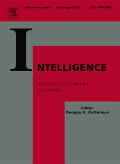
INTELLIGENCE
Scope & Guideline
Pioneering Research in Human Intelligence
Introduction
Aims and Scopes
- Artificial Intelligence and Machine Learning:
The journal publishes research on various AI methodologies, including neural networks, natural language processing, and machine learning techniques applied to real-world problems. - Data Management and FAIR Principles:
A strong emphasis is placed on the management of data, particularly in relation to the FAIR principles (Findable, Accessible, Interoperable, and Reusable), ensuring that data is handled responsibly and effectively. - Knowledge Graphs and Semantic Technologies:
Research on knowledge representation, knowledge graphs, and semantic technologies is a core area, focusing on how these tools can enhance understanding and accessibility of information. - Interdisciplinary Applications:
The journal encourages interdisciplinary research, showcasing applications of intelligence in diverse fields such as healthcare, environmental science, and social sciences. - Ethics and Societal Impact of AI:
A unique contribution of the journal is its focus on the ethical implications and societal impacts of AI technologies, addressing concerns related to privacy, bias, and transparency.
Trending and Emerging
- Generative AI and Language Models:
There is a growing trend in research related to generative AI, particularly around language models like ChatGPT, showcasing interest in their applications, limitations, and ethical considerations. - Sustainable Data Practices:
Emerging themes around sustainable data management practices and the integration of environmental considerations into AI research are becoming increasingly prominent. - AI in Healthcare and Biomedicine:
The journal is seeing a rise in publications that apply AI methodologies specifically to healthcare, including diagnostics and patient management, reflecting the urgent need for innovative solutions in this sector. - Contextual and Ethical AI:
Research focusing on the contextual application of AI and the ethical implications of AI technologies is gaining traction, indicating a shift towards more responsible and transparent AI practices. - Interdisciplinary Approaches to AI Challenges:
There is an increasing emphasis on interdisciplinary research that combines insights from various fields to tackle complex AI challenges, particularly in societal contexts.
Declining or Waning
- Traditional Statistical Methods:
There has been a noticeable decrease in publications focused solely on traditional statistical methods, as the journal leans more towards advanced AI and machine learning approaches. - Generalized Data Science without Specific Applications:
Papers that discuss data science in a broad sense without specific applications or case studies are becoming less frequent, as the journal favors targeted research with clear implications. - Outdated Technologies and Frameworks:
Research focusing on older technologies or frameworks not aligned with current trends in AI and data management is declining, as the journal prioritizes innovative and contemporary approaches.
Similar Journals

Journal of Advanced Computational Intelligence and Intelligent Informatics
Pioneering Research in AI and Human-Computer InteractionThe Journal of Advanced Computational Intelligence and Intelligent Informatics, published by FUJI TECHNOLOGY PRESS LTD, stands as a pivotal platform in the fields of Artificial Intelligence, Computer Vision, and Human-Computer Interaction. Established in 1997, this Open Access journal has been providing accessible insights into the latest advancements in computational intelligence and informatics since 2007. With its ISSN 1343-0130 and E-ISSN 1883-8014, this journal invites a diverse readership, including researchers, professionals, and students eager to explore innovative methodologies and applications. Despite its current Q4 ranking in the relevant categories, the journal remains committed to contributing valuable knowledge to the academic community and enhancing the global discourse in computational technologies. With its focus on fostering communication and collaboration among scholars, the journal plays an essential role in driving forward the understanding of intelligent systems and their applications in various domains.

Journal of Cognitive Science
Connecting Minds: Bridging Theory and ApplicationThe Journal of Cognitive Science, with ISSN 1598-2327, is a distinguished publication from SEOUL NATL UNIV, INST COGNITIVE SCIENCE, focusing on the multidisciplinary field of cognitive science. Established in 2016, this journal aims to advance knowledge in various domains, including Artificial Intelligence, Cognitive Neuroscience, and Experimental Psychology, while also delving into Linguistics and Language. Although currently categorized in Q4 for several subjects in the 2023 rankings, it presents an invaluable platform for innovative research and scholarly discourse, providing insights that connect cognitive processes with practical applications, thus fostering cross-disciplinary collaboration. Located in South Korea, the journal adheres to rigorous academic standards, inviting submissions that contribute significantly to understanding cognition in a digital age. While it does not offer Open Access, readers can access articles through university libraries and academic databases, engaging with the latest findings and theories that shape the future of cognitive science.
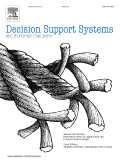
DECISION SUPPORT SYSTEMS
Empowering Decisions Through Innovative ResearchDECISION SUPPORT SYSTEMS is a premier academic journal published by ELSEVIER, widely recognized for its contribution to the field of applied sciences, particularly in Information Systems, Developmental Psychology, and Management Information Systems. Since its inception in 1985, the journal has evolved through 2024 to maintain its position in the Q1 category across multiple disciplines, reflecting its premier status with exceptional rankings, such as #4 in Arts and Humanities and #7 in Developmental Psychology. DECISION SUPPORT SYSTEMS serves as a crucial platform for researchers, professionals, and students, facilitating the exchange of innovative methodologies and theories that advance decision-making technologies and improve understanding in complex systems. Although it does not offer Open Access options, its rigorous peer-review process ensures that only high-quality, impactful research is disseminated to its global readership. This journal is instrumental for those looking to enhance their expertise and contribute to the ongoing dialogue in decision support systems and related areas.
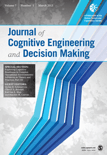
Journal of Cognitive Engineering and Decision Making
Bridging psychology and technology for smarter choices.The Journal of Cognitive Engineering and Decision Making, published by SAGE Publications Inc, stands at the forefront of interdisciplinary research in the fields of applied psychology, human factors, computer science applications, and engineering. Established in 2007, this esteemed journal reflects a commitment to advancing the understanding of cognitive processes and decision-making methodologies through rigorous scholarly articles. With an impressive impact factor and categorized within the prestigious Q1 and Q2 quartiles across pertinent fields, the journal provides a vital platform for researchers, professionals, and students aiming to enhance the intersection of cognition and engineering practices. Subscribers can access a wide array of articles that delve into cutting-edge research, practical applications, and innovative developments, all while contributing to the ongoing dialogue surrounding human-centric design and decision-making strategies. As the journal continues through its converged years until 2024, it promises to play an essential role in shaping the future discourse in cognitive engineering and decision-making.
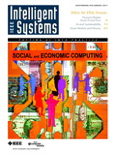
IEEE INTELLIGENT SYSTEMS
Transforming Challenges into Intelligent InnovationsIEEE Intelligent Systems, published by the renowned IEEE Computer Society, stands at the forefront of research in the fields of Artificial Intelligence and Computer Networks and Communications. With an impressive Q1 ranking in both categories as of 2023 and Scopus rankings placing it in the top 5% of its field, this journal not only showcases cutting-edge scientific advancements but also serves as a vital resource for practitioners, academics, and students seeking to deepen their understanding and application of intelligent systems. The journal covers a broad range of topics including machine learning, data mining, and system architectures, reflecting its commitment to addressing contemporary challenges and innovations in technology. Although it does not offer open access, the journal's research contributions are invaluable, ensuring that its readership remains engaged with the latest findings and applications in a rapidly evolving field. For those interested in submitting high-quality research or staying updated on the latest developments, IEEE Intelligent Systems represents an essential hub of knowledge.

Data Intelligence
Transforming Research into Impactful ApplicationsData Intelligence, published by MIT PRESS, is an influential open-access journal dedicated to advancing knowledge within the intersecting fields of Artificial Intelligence, Computer Science Applications, and Information Systems. Since its inception in 2019, it has rapidly established itself as a leading academic platform, achieving impressive rankings—including Q2 in its principal categories for 2023—demonstrating its impact and relevance in these dynamic fields. With an E-ISSN of 2641-435X, Data Intelligence aims to bridge theoretical research and practical applications, providing a venue for scholars and practitioners to disseminate innovative research and ideas. The journal's commitment to open access ensures that cutting-edge research is accessible to a broad audience, fostering collaboration and knowledge sharing among the global community of researchers, professionals, and students. Located in Cambridge, MA, Data Intelligence continues to pave the way for transformative insights in the realm of data-driven technologies through its rigorous peer-reviewed content and a wide array of interdisciplinary perspectives.
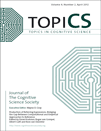
Topics in Cognitive Science
Advancing the Frontiers of Human CognitionTopics in Cognitive Science, published by WILEY, is a premier interdisciplinary journal that advances the understanding of the cognitive processes that underpin human behavior and interaction with technology. With a commendable impact factor and a strong focus on research from 2009 to 2024, this journal garners significant attention in various subfields, as evidenced by its Q1 ranking in Experimental and Cognitive Psychology and Linguistics and Language, alongside a Q2 position in Artificial Intelligence, Cognitive Neuroscience, and Human-Computer Interaction. Researchers and professionals will find invaluable insights into the latest experimental findings, theoretical discussions, and practical applications that bridge cognitive neuroscience, psychology, and computer science. Topics in Cognitive Science is especially pivotal for those aiming to delve deeper into cognitive mechanisms and their implications within our increasingly digital world, making it an essential resource for students and scholars alike.

Big Data and Cognitive Computing
Catalyzing Discoveries in Artificial Intelligence and Data Science.Big Data and Cognitive Computing is a premier open-access journal published by MDPI, dedicated to advancing research in the dynamic fields of artificial intelligence, computer science, information systems, and management information systems. Since its inception in 2017, the journal has established a significant presence, reflected in its impressive categorization within the Q2 quartiles for multiple disciplines in the 2023 rankings. Situated in Switzerland, the journal provides a vital platform for researchers, professionals, and students to publish groundbreaking work and access high-quality articles, enhancing the exploration of big data applications powered by cognitive computing. With an increasing global emphasis on data-driven decision-making, Big Data and Cognitive Computing offers unrestricted access to innovative research findings, addressing both theoretical and practical aspects. The journal's contributions are integral for those looking to stay at the forefront of technological advancements and their implications across various sectors.
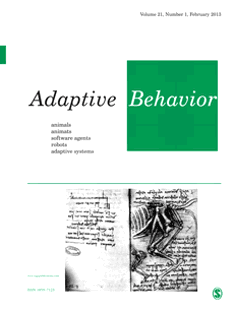
ADAPTIVE BEHAVIOR
Transforming Perspectives on Adaptive MechanismsADAPTIVE BEHAVIOR is a renowned academic journal published by SAGE PUBLICATIONS LTD, dedicated to advancing the understanding of adaptive mechanisms in behavior across a spectrum of disciplines. With a focus on Artificial Intelligence, Behavioral Neuroscience, and Experimental and Cognitive Psychology, this journal aims to facilitate the dissemination of innovative research and theoretical advancements that relate to adaptive behaviors in both humans and artificial systems. The journal, which spans from 1992 to 2024, holds a commendable position within its field, ranked in the Q3 category for multiple categories, and Q1 in Philosophy. Furthermore, it is recognized within Scopus rankings, ensuring its impact and relevance in the academic community, with a notable rank of #57 in Experimental Psychology and #49 in Behavioral Neuroscience. While ADAPTIVE BEHAVIOR does not currently offer Open Access options, it maintains a vital role in bridging disciplines and fostering discourse among researchers, professionals, and students who are exploring the complexities of behavior in adaptive systems.
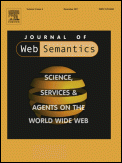
Journal of Web Semantics
Shaping Tomorrow's Web: Insights from Leading Scholars.Journal of Web Semantics, published by ELSEVIER, stands at the forefront of interdisciplinary research in the realms of Computer Networks and Communications, Human-Computer Interaction, and Software Engineering. With an impressive impact on the academic landscape, this journal holds a significant Q2 quartile ranking in multiple fields as of 2023, reflecting its strategic positioning within the top tier of scientific journals. As a valuable resource for researchers, professionals, and students, it provides a platform for innovative articles addressing contemporary challenges and advancements in web semantics—a crucial aspect of improving web usability and data integration. Operating with a Scopus Rank that places it in the commendable 71st, 67th, and 60th percentiles across its respective categories, the journal facilitates access to high-quality research findings, fostering a vibrant community of scholars dedicated to enhancing the synergy between technology and human interaction. The Journal of Web Semantics continues to evolve, marking its significance from 2003 to 2024 and offering a vital space for discourse that shapes the future of web technologies.